Not Your Average Valentine’s Day Date Low-key and offbeat Valentine’s Day date ideas — with or without the kids
25/ Destination: Funko HQ
The perfect place for kids (and parents!) infatuated with pop culture

FEBRUARY 2023 | PARENTMAP.COM
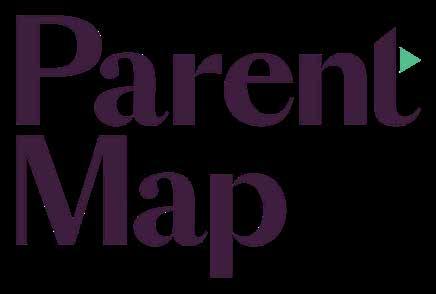

Not Your Average Valentine’s Day Date Low-key and offbeat Valentine’s Day date ideas — with or without the kids
25/ Destination: Funko HQ
The perfect place for kids (and parents!) infatuated with pop culture

FEBRUARY 2023 | PARENTMAP.COM

Get an exceptional, private, Jewish day school education for less than you ever imagined. of your adjusted gross income, whichever is less.



Families making up to qualify.
Find out if you qualify at: samisfoundation.org/eligibility-estimator
Jewish day school of your choice.

Head to the perfect place for Disney-obsessed littles, middle-school-age Marvel fiends, teens infatuated with anime and cult classics — and their parents, who love it all!





“I wrote chants and led teams and wore body paint and tried archery. I opened myself up to some of the deepest friendships I have ever known.” p. 16
As I reflect on the multi-faceted theme at the center of our annual February issue — love! — I am anticipating a visit from Mo, a childhood friend of my longest acquaintance who is touring Seattle University with her eldest daughter.
So much of how we learn to love begins with the extraordinary ordinariness of childhood friendship and its uncomplicated but sturdy base metal: pure like. As kids, we like the people we like because we like them — we don’t strain ourselves to scrutinize their faults (a particularly ungenerous habit of adults). Children are naturals at like.
What Mo and I learned at the home-based preschool operated by big-hearted Rita Kelly: reciprocity, silliness, manners and loyalty. I would go so far to say even criminal conspiracy, for Mo was my first partner in a caper so inept and disastrous that its humiliating discovery fundamentally put us both on the straight and narrow path of decency at the very precocious age of maybe 4 or 5.
We nicked an (unsweetened) packet of lime Kool-Aid mix from Rita’s vast pantry stash and crept into the bathroom to share it. Oh, mother pucker! If there is anything worse than being caught red-handed, it has to be:
From the bedrock like of childhood friendship, many of us enter the blast furnace of “falling in love” during adolescence. Friend and former ParentMap colleague Natalie Singer-Velush writes about such a first real love in her beautiful essay about the life-changing experience of summer camp on p. 16.
From quicksilver yearnings of young love, we flit from one form of attraction to the next, distilling phases of intimacy and commitment as we mature. We begin to mine golden nuggets of kindness, generosity, trust and forgiveness from the less refined ore of our infatuations, petty selfishness and heartbreaks. Slowly, we forge the alloy of compromise, solidarity and responsibility that is required if an important relationship is to endure. To a greater or lesser degree (and depending on the day), the satisfactions and benefits that our partnership furnishes hopefully mostly distract us from the pain of our own emotional evolution.
But then, a child comes into our life, and the arc of love is forever altered. The love we feel for our child engulfs us with an unforeseeable intensity. We discover (maybe for the first time ever) that it is actually quite natural and transformative to empathize with another person. And even when it feels like a labor (!) to love our child, we are compelled to do so — by nature and by destiny. We become the person we truly are: a person who knows how to love.
Within the pages of this month’s issue, you’ll find dozens of nifty notions for celebrating your favorite loved ones, from family-friendly fun (Play List, p. 18) to low-key and offbeat Valentine’s Day date night ideas (p. 21) to a PNW pilgrimage that is all about geek love (Destination: Funko HQ, p. 25). If you only read one thing in this issue, let it be our feature by ParentMap’s own Kari Hanson on ways all of us can help children experiencing foster care (Fostering Connections, p. 8).
— Patty Lindley, managing editorFEBRUARY 2023, VOL. 20, NO. 2
PUBLISHER
Alayne Sulkin
EDITORIAL
MANAGING EDITOR
Patty Lindley
OUT + ABOUT EDITOR
Nancy Chaney
DIGITAL CONTENT PRODUCTION
COORDINATOR
Kari Hanson
OUT + ABOUT EDITORIAL ASSISTANT
Julie Dodobara
COPY EDITOR
Sunny Parsons
CONTRIBUTORS
Gemma Alexander, Nancy Chaney, Kari Hanson, Natalie Singer-Velush, Jenna Vandenberg
DIGITAL MARKETING
EMAIL MARKETING SPECIALIST
Devon Hammer
DIGITAL MARKETING COORDINATOR
Taryn Weiner
SOCIAL MEDIA SPECIALIST
Emily Feely
ADVERTISING SALES + PARTNERSHIPS
SENIOR ADVERTISING AND PARTNERSHIPS MANAGER
Ida Wicklund
COMMUNITY PARTNERSHIPS
AND CLIENT ENGAGEMENT MANAGER
Jessica Collet
ADVERTISING CLIENT SERVICES
ASSISTANT
Angela Goodwin
CLIENT SERVICES PRODUCTION
COORDINATOR
Mallory Dehbod
EVENTS
EVENT OPERATIONS
Brenna McCown
EVENTS MARKETING SPECIALIST
Nicki Sherr
ART + PRODUCTION
SENIOR DESIGNER
Amy Chinn
ADMINISTRATION
BUSINESS MANAGER
Carolyn Brendel
PARENTMAP EDITORIAL ADVISORY BOARD
Benjamin Danielson, M.D. CLINICAL PROFESSOR, UW SCHOOL OF MEDICINE
PRACTICING PHYSICIAN, UW MEDICINE
Joan Duffell
RETIRED EXECUTIVE DIRECTOR, COMMITTEE FOR CHILDREN
John Gottman, Ph.D.
THE GOTTMAN INSTITUTE
PROFESSOR EMERITUS, UNIVERSITY OF WASHINGTON
Laura Kastner, Ph.D.
PSYCHIATRY + BEHAVIORAL SCIENCES, UNIVERSITY OF WASHINGTON
Bea Kelleigh
VICE PRESIDENT, DOVETAILING, LLC
Yaffa Maritz, M.A.
FOUNDER, LISTENING MOTHERS + COMMUNITY OF MINDFUL PARENTING
Ron Rabin
EXECUTIVE DIRECTOR, KIRLIN CHARITABLE FOUNDATION
Daniel J. Siegel, M.D.
EXECUTIVE DIRECTOR, MINDSIGHT INSTITUTE
ParentMap is published
What is your favorite family date-night activity?
Classic board (bored?) games and Thai food
Play card games, with just our family or even a few friends Order takeout for delivery and pig out in front of the TV Disney+ movie premiere nights with frozen pizza and snacks
We make homemade sushi!
CONTACT INFORMATION
Advertising information 206-709-9026 or advertising@parentmap.com
Fax 206-709-9031
Calendar submissions
calendar@parentmap.com
Editorial submissions
editor@parentmap.com
Distribution distribution@parentmap.com
Administration 206-709-9026, parentmap.com
Subscriptions subscriptions@parentmap.com
Subscription rate
1 year: $12







This is an amazing book, wise and extremely useful. It is a must read for anyone who wants to have emotionally satisfying relationships. Buy this book! It will change your life.
John Gottman, Author of “The Seven Principles for Making Marriage Work”



Two seasoned relationship experts address the top problems in relationships and provide simple strategies and exercises, grounded in relationship science, that couples can use to have the healthiest –and happiest – relationship of their lives.


Pre-order now: amazon.com


There are many reasons why people avoid seeing their doctor until someone gets sick. But regular checkups are a powerful line of defense that can prevent illness in the first place. Regular health care is especially important for young children.
“Well-child visits focus on growth, development and preventative care tailored to the child’s age,” says Andrea Donalty, M.D., medical director of the Mary Bridge Primary Care Network for Mary Bridge Children’s Hospital. When you take a sick child to the doctor, the doctor may not be able to perform early-detection screenings or provide preventive care, such as vaccinations. Skipping well-child visits also delays the opportunity to build a long-term relationship with a care team who understands what is normal for your child and who knows your family’s medical history.
Although we call it routine, a lot of preventive care is age-dependent and individualized. Even routine elements of a wellness visit — such as measuring height and weight — are checking for a healthy trajectory of growth over time that is unique to your child. For newborns and infants, routine visits can teach parents and guardians about healthy feeding and sleep practices, and what symptoms may warrant an emergency visit.
As children grow, well-child visits include a variety of age-appropriate screenings that can catch many health concerns before they become serious. For example, mental health screenings are becoming standard for older children and teens. The U.S. Preventive Services Task Force recommends that children ages 8–18 be screened for anxiety, and children ages 12–18 be
screened for depression and suicide risk.
“We have seen a huge rise in anxiety and depression in adolescents. We try to identify these things early so we can get them connected with the right help and prevent more significant health concerns from developing in the future,” says Donalty.
Well-child visits can also include screening for lifestyle determinants of health, such as traumatic events, food insecurity and even caregivers’ mental health. Health-care providers can provide coaching, resources and referrals for concerns ranging from postpartum depression to hunger.
The importance of routine preventive care and an ongoing relationship with a care team is nowhere more evident than vaccination. If the same provider can’t be seen, sharing the previous medical records or out of state/country immunization records with the new provider in advance of the next visit can help inform medical history and keep the conversation and momentum going toward healthy development.
The Centers for Disease Control and Prevention’s Advisory Committee on Immunization Practices maintains the standard schedule of basic vaccinations. The result of decades of research to identify the safest and most effective way to protect children from disease, the schedule is endorsed by the American Academy of Family Physicians and the American Academy of Pediatrics.
Getting your child vaccinated not only protects them, it protects others, too. “The higher the vaccination rate in the community, the more protected the vulnerable can
be.” Keeping up to date on vaccination is the best way to prevent serious illness from childhood diseases. Vaccinations are even more strongly recommended for immunocompromised children, because their risk from infections is higher.
“Vaccines are safe. They are effective, and we don’t see a lot of these illnesses anymore because of the success of vaccines. It is so immensely important for people to get in for their well-child visits and to stay on schedule with their vaccines. It’s advantageous to have that trusting relationship with your primary care pediatrician, family physician or nurse practitioner to be empowered towards vaccinations,” says Donalty.
The flu vaccine is recommended annually for everyone ages 6 months and older. In homes with infants younger than 6 months, vaccinating the rest of the family can help protect the infant by reducing exposure to infection. Although the flu vaccine does not guarantee that an individual will not contract the flu, it does reduce the chances and intensity of infection.
“Not only does it lessen the course of the disease, greatly reducing the risk of hospitalization, but it provides some carryover protection from year to year,” says Donalty. Even if someone has already had the flu this season, it is possible to catch another strain. Getting vaccinated now will protect against other strains of the virus. (Learn more about protection for the flu at KnockOutFlu.org.)
While available COVID-19 vaccinations may reduce the likelihood of infection, they are
no guarantee against becoming sick. Donalty notes, “You get the COVID-19 vaccine to prevent significant health issues from infection.” Vaccination decreases the risk of hospitalization or death from infection and may also reduce the risk of long COVID.

The current recommendation is that everyone ages 6 months and older complete their primary vaccine series and stay up to date on eligible booster doses. There are different brands and doses of each vaccine, so the exact number of injections and timing for receiving them will vary. The timing of a dose may be adjusted to leverage natural immunity for people who have recently recovered from a COVID-19 infection. Communicate with your primary care provider to work out the best COVID-19 vaccination schedule for you and your family. Visit TakeCareWA.org for more information about protecting yourself and loved ones from COVID-19.
Healthier choices to prioritize good nutrition, adequate sleep and exercise are the foundation of overall health. But when it comes to avoiding viruses, it’s about following “things told to us when we were little,” says Donalty. Wash hands well and frequently, and use hand sanitizer when you can’t wash. Cover your coughs and sneezes, and avoid touching your face. Stay home when you’re sick. The only recent addition to the recommendations is masking to prevent the spread of germs.
Building the routine of going to well-child visits not only prevents illness through vaccination and early detection, it can result in better-informed parents and guardians who build habits that keep the whole family healthier. ■
Seattle-based freelance writer Gemma Alexander focuses on the intersection of parenting and the arts. When she’s not writing for ParentMap, she blogs at gemmadeealexander.com and tweets @gemmadeetweet.







Sponsored by
















The Department of Health works to protect and improve the health of all people in Washington state by leading changes in policies, systems and environments to prevent illness and injury; promoting healthy families and communities; encouraging healthy lifestyles; and focusing on places where people live, learn, work, recreate, seek health care and worship.


If you’ve gotten behind on your child’s checkups or immunizations during the pandemic, there’s no time like the present to get back on track. And remember, children 6 months and up can get the COVID-19 and flu vaccine at the same time.
Reach out to your child’s doctor or clinic today.
with a nonrelative foster family, including minimized trauma, connection with siblings, and improved behavior and mental health outcomes. Hopefully, the percentage of youths placed with family will continue to increase.
By Kari Hansonchildren are nearly three times as likely to be placed in out-of-home care than white youths; African American children are twice as likely to be placed in out-of-home care than white youths.
Before I became a foster parent, foster care was one of those things that I had heard of but never gave much thought to, thanks in large part to my privilege of being a white, married, middle-class, heterosexual, cisgender person. For me, foster care was a storyline in movies and TV shows (sometimes portrayed accurately, sometimes not), or a news story that popped into my social media feed every once in a while.
But for thousands of families in Washington state, navigating the foster care system is a daily reality. There are approximately 8,000 children living in out-of-home care in our state. While that is a high number, there are a couple of reasons to be optimistic:
• The number of youths experiencing foster care in Washington state has been trending downward for the past several years.
• Almost 44 percent of youths in foster care in Washington are placed with a relative (called kinship care). While there is room for improvement, this percentage is higher than the national average. Youths in kinship care have more positive outcomes than those who live
In Washington, approximately 77 percent of youths enter foster care due to neglect, which is often the result of the trauma and challenges their parents are dealing with. Many of these families could benefit from preventive services and support, which would perhaps eliminate the need for their children to be removed.
Recent laws such as the Family First Prevention Services Act of 2018 and the Family First Transition Act of 2019 allow states to use federal funds for preventive services, rather than for foster care expenses only. While this shift toward prevention and support may be occurring, it is happening slowly. In 2020, Washington spent $188.7 million on foster care, compared to just $10.7 million on preventive services such as substance abuse treatment, mental health care and parental skills training.
Within three years of entering foster care, approximately 57 percent of children will be reunified with their parents; 16 percent will be adopted; 5 percent are placed with a guardian; 3 percent become emancipated; and 16 percent remain in foster care. The average time a child stays in foster care is 15–18 months.
The impact is not equal Foster care does not impact all children and families equally. Native American
LQBTQIA+ youths are overrepresented in foster care as well, and are also often experiencing family rejection in addition to other trauma. If a youth who identifies as LGBTQ does not feel supported in their foster home, they are more likely to run away, and therefore more likely to experience homelessness. In fact, 40 percent of youths experiencing homelessness identify as LGBTQ, and 33 percent of Washington youths who have spent time in foster care experience homelessness by the time they turn 21.
While youths from any socioeconomic background can, and do, experience abuse or neglect, children are removed from their homes more frequently in lower-income communities. Keeping youths experiencing foster care close to their schools, churches, friends and other sources of support is critical for their success. However, often foster families are not available in the communities from where children are most frequently removed, resulting in children being placed far away from their support systems. Placing children outside of their communities also presents an extra challenge for parental visits.
The goal of foster care is for children to be able to return home to their parents; this is referred to as reunification. Nearly 60 percent of youths who experience foster care in Washington state are able to reunify
Everyone can help children who are experiencing foster care
with their parents. Only about 16 percent of youths who experience foster care wind up being adopted by a nonfamily member.
Foster parents can support the goal of reunification in a number of ways, including by:
• Making sure the child is available and ready for visits.
• Establishing a relationship with the child’s parent(s).
• Communicating regularly with the child’s parent(s).
• Speaking in a positive way about the child’s parent(s).
Of course, reunification is not always possible, and sometimes adoption does become a child’s permanent plan. Organizations such as Northwest Adoption Exchange (nwae.org) work to find adoptive homes for youths experiencing foster care in Oregon, Washington and Alaska.
The foster care system can often seem like a bunch of individuals in various silos focused on their own role in the larger process. Social workers deal with paperwork and the legal side of cases. Foster parents and kinship providers address the day-today care and needs of the children placed in their homes. Parents attend meetings, court hearings and parenting classes, trying to jump through all of the hoops presented to them so that they can reunite with their children.
Too often, these key players are not given the opportunity to connect and figure out how to work together toward the goal of reunification. Connection is what’s often missing, and connection is key.
Luckily, programs exist to help build connection and break down barriers built up by fear. One such program is the Family Connections Program at Amara (amarafamily.org). Amara is located in both King and Pierce counties, and it has been supporting foster youths and families for more than 100 years. The
organization licenses and supports foster parents and kinship providers, and works to promote and support connections between foster parents and parents whose children have been removed from their home.

The Family Connections Program brings parents whose children are placed in out-of-home care and those caring for the children (foster or kinship caregivers) together to have a facilitated, collaborative, child-focused conversation. These conversations allow parents and caregivers to connect and make a plan to work together to support the child(ren) they all care about. Nicole Mazen, Amara’s chief program and policy officer, explains, “We are working toward a system that supports a community approach rather than an individualistic one.”
Youths experiencing foster care often
struggle with dual loyalties. Even though their home life may have been challenging, kids love their parents. But at the same time, they might also discover happiness in a foster home — holding both of those feelings at the same time can be a big challenge. They may wonder if it’s okay to tell their foster parent that they miss and love their mom. They may feel nervous telling their parents about a fun activity or outing with their foster parent. When they are able to see their parents and their foster parents communicating and working together, the “us versus them” feelings may subside.
If you do end up adopting a child through foster care, maintaining that connection to their family is incredibly important. Children need to know where they come from, as well as the truth (in age-appropriate terms) about their past and history.
continued from page 9
Sometimes parents feel like they are protecting children from information that is hard to hear, but when children lack this information, they tend to make up stories, which can oftentimes be much more exaggerated than the truth.
It is important to remember that, like any other relationship, the connection you have as a foster parent, kinship provider or adoptive parent with a child’s family will change over time. Situations and people change over time, and remaining open to that change is critical.
While reducing the number of youths who are removed from their families in the first place and relying on kinship care as much as possible are best, there is still currently a need for foster parents. According to
data from the Washington State Department of Children, Youth & Families (DCYF; dcyf.wa.gov), there has been an overall decline in the number of foster homes across Washington state. In March 2019, there were 5,061 licensed foster homes; as of September 2022, that number had fallen by 16 percent, to 4,257. Keep in mind that this is the number of licensed homes, which is smaller than the number of homes that have an opening for a child entering foster care. Some of those homes are already full, some are not taking new placements for a variety of personal reasons, and some became licensed to provide care for a specific child. This lack of foster homes makes it incredibly hard for children to be placed in a home that can meet their specific needs, in their specific community.
of youths experiencing foster care. Amara works to ensure that the foster parents it licenses are prepared to meet the diverse needs of the youth they will be caring for. Mazen notes, “Throughout our work with families, we ensure that they are gaining the necessary skills to provide open, affirming, loving and relationship-focused homes. We expect that our families will be able to meet the unique identity needs of youths they welcome into their home: This includes their cultural identities, their SOGIE [sexual orientation, gender identity and expression], their identity as a youth in foster care, and their relationships with their parents and extended family.

Support to uplift women, men, and families in every way possible, focusing on mind, body and soul
Counseling
• Parenting Classes
The need is especially high for foster homes that can meet the diverse needs
Transforming Your Relationship With Your Child:
• Postpartum Workshops



• Education Support
• Resources
• Online Yoga
Jasmine McCarthy, LMHCA, provides counseling for kids 5 to 18 years old plus young adults.
Jasmine offers her services in client homes in the greater Seattle area, or via telehealth throughout Washington state.

10 / PARENTMAP.COM
Appointments available immediately!
Incredible Years Parenting Program
• Evidence-based parenting classes offered online in group settings or in family’s home
February 4–March 11 · 10:00–11:00 AM on Saturdays
Cost: $150 for public
Register: Call 425-882-4347 or Email slp@everhear.com
This six-week online workshop is offered as an in-depth experiential training on The Nurtured Heart Approach and is designed for any overwhelmed parent, educator or clinician who has found conventional methods have fallen short in helping children with intense behaviors thrive despite the best of intentions.
This workshop will help you:
• Deepen the connections and attachments with children in your world. Gain new perspectives for approaching intense behavior in children and see it as a gift rather than a deficit.
• Learn tools and strategies for building the Inner Wealth of all children and approaching intense behavior.
• Learn how to set clear boundaries and limits that empower you and your children.
NURTURED HEART APPROACH TO CONTINUING EDUCATION
For detailed information regarding these trainings, visit nurturedheartinstitute.com.
Facilitated by NHA-Advanced Trainer and Evergreen Speech and Hearing Clinic
Speech-Language Pathologist
Jennifer Dierenfeld M.A., CCC-SLP Evergreen Speech and Hearing Clinic
Becoming a foster parent means being part of a team, working with others to help support kids and their families. It means being open to uncertainty, being willing to build connections, and having a continued on page 13 thewfws.com




Myth: Kids are in foster care because they are bad. Reality: Children enter foster care because they are in an unsafe situation that is outside of their control, not because of something they did. Youths experiencing foster care are exactly like any other child you’ll encounter. Some of them are dealing with different traumas, but they are just kids who need love, patience and support.
Myth: Birth parents are scary. Reality: Parents who have had their children removed from their care are likely struggling and dealing with complex challenges. But they are people and parents, just like you and me. We all have periods of struggle in our life, we all need empathy, and we are all capable of growth and change.
Myth: I can’t be a foster parent because it will be too hard to have a child leave my house. Reality: Yes, reunification can be painful for foster parents. But that’s okay — that’s part of the deal. Your job as a foster parent is to provide a safe, loving home for a child until they can go back to their parents. And while that transition can be painful in the short term, being involved in helping a family stay together is an experience that will stay with you forever.
Myth: I can’t be a foster parent because I’m single/LGBTQ/don’t make enough money/ don’t own a home, etc. Reality: There is a need for diverse foster parents to help meet the needs of diverse foster youths. The thing you think might hold you back from being a foster parent is probably actually an asset! You can rent an apartment or own a home, be married or single, be heterosexual, gay, pansexual, transgender, etc., and be a foster parent.

Myth: I will just adopt the first child placed in my home. Reality: Only 16 percent of kids who experience foster care are adopted by a nonfamily member. It does happen sometimes, but it is not the norm, and should not be your goal as a foster parent. If you are interested in adoption only, check out Northwest Adoption Exchange (nwae.org) or AdoptUSKids (adoptuskids.org). These organizations work to find adoptive families for kids who cannot reunify with their parents.





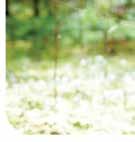











continued from page 10
desire to actively listen, empathize and engage with families.

There are several different ways you can go about becoming a foster parent in Washington state. You can become licensed directly though the State of Washington by applying through the DCYF website, where you will find more information, including the (many) forms you’ll need.


Another route to becoming a foster parent is to work with a private agency, known as a child placement agency (CPA). CPAs hold about 33 percent of the licensed foster homes in the state. People often choose to become licensed through a CPA because the agency is able to offer higher levels of support and guidance to foster parents. You can find a CPA that is a good match for you by filling out a quick form on the Washington Fosters website (foster.wachildrenandfamilies.org).
If you would like to learn more about becoming licensed with Amara, the first step is to attend an orientation meeting (Amara information meeting, or AIM). You can find a list of upcoming meeting dates and times, on the website; you can also register there.
















If it’s not the right time for you to become a foster parent, there are other ways to support foster kids and families in your community. Organizations such as Treehouse (treehouseforkids.org) need donations and volunteers to support youths experiencing foster care with their education goals. The organization also provides items, such as clothing and toys, to foster families for children placed with them. Visit Fostering Family (fosteringfamilywa.org) for other ways to get involved — from volunteering to supporting foster youths or taking legislative action.
Foster care is a far from perfect system that impacts thousands of families in Washington. As a community, we all can play a role in supporting these families, whether that’s by becoming a foster parent, supporting a parent or family in your community, or volunteering with a local organization. ■
Kari Hanson is ParentMap’s digital content coordinator. She is the mom of two boys and when she isn’t writing, she can typically be found crocheting, sewing or being pulled around the block by her sweet and enthusiastic dog.
For ages 3–18

























Summer camp changed my life.
I still can’t say exactly what it was about camp that turned me into a different girl every summer. But somewhere between the sweaty city limits of my boring urban childhood universe and the mountainous, leafy world north of my hometown of Montreal, a switch flipped. Suddenly, I wasn’t a not-very-popular girl whose parents were divorced, who was laden with homework and a mortifyingly uncool coat, waiting for the bus in the slushy, frigid winter.
I was free, mixing with a different crowd of kids from dozens of different schools. The usual cliques were nowhere to be seen. I had a duffel bag full of awesome camp gear: desert boots, unionsuit pajamas with a rear that unbuttoned (!), a yellow raincoat, plaid lumber jackets and wool socks, all purchased on the cheap from an Army surplus store. And there were no parents — the only authority was our counselor staff, whose members were just a few years older than the campers and so very cool.
It didn’t look like much when you first arrived, my camp: a weathered wooden archway, a dirt path, just wide enough to admit a maintenance truck — or an overheated school bus, its windows yanked down to circulate a warm summer breeze, the chatter of 70 kids flying out into the dusty country air.
Right now, countless parents are weighing whether enabling their children to live away from home for a spell at sleepaway camp is valuable, doable or wise. What trouble will they get into away from parental supervision?

But as I had considered when to send my two girls for their first overnight camp experiences, I’d argue that camp teaches the kind of values and character development that parents most want for their kids. Kids learn to function and thrive independently, developing skills that might make the difference between your kid succeeding in life after high school despite challenges and ending up back in your basement after “failing to launch.”
The time and space to explore boundaries, and to learn to manage freedom smartly and safely, is priceless. Give your kid time away, and they will give it back down the road tenfold. It will help them become leaders, develop grit and character, learn empathy for others and tap into their dreams.
I experienced a lot of firsts at camp: My first swim across the intimidating maw of a real (big!) lake. My first time sailing a boat
on my own. My first bout of homesickness. My first time acting in a play. And during my last summer, my first real love. We zeroed in on each other at the Saturday-night social that first week, my heart thumping nervously, his drumsticks sticking out of the back of his jeans pocket. That sweet first romance, under the impossibly bright stars of a mountain summer, will be with me all of my life.
But I also did things I never would have done in real life: I completed multiple five-day canoe trips — mini-excursions away from regular camp and into the true wilderness, navigating past a suspicious moose, building a fire and cooking meals over it. I tackled my fear of bodies of water. I wrote chants and led teams and wore body paint and tried archery. I opened myself up to some of the deepest friendships I have ever known. I learned to shower next to spiders.
Most importantly, I tapped into a community — a family — that stretched back long before me, that helped anchor me to my own life: The family of my camp, with its generations of wooden plaques and rustic rituals, its dirt paths and canvas tents, and its magical grasp on my heart. ■
Natalie Singer-Velush is a writer and communications manager. She lives in Seattle with her husband and two daughters and enjoys beachcombing, reading, feeding people and exploring the Pacific Northwest with her family.










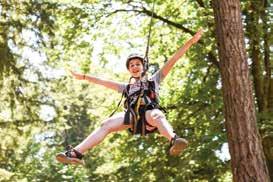
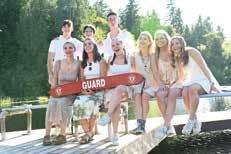
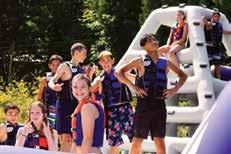





Check out many more happenings online at parentmap.com/calendar.
February is the bridge between the dead of winter and the verdant promise of spring, signaled by the first crocuses busting up through the cold ground to show their colors. Just like the crocuses, we’re busting out of the gray to celebrate Black History Month, make a date with our favorite people, spot some eagles and much more. Mark your calendar with these top events for family fun and learning time this month!
� February is Black History Month, an excellent time to visit Seattle’s recently reopened Northwest African American Museum (NAAM). Housed in the beautiful and historic Colman School building, NAAM showcases the history, art, voices and experiences of our local Black community. Open Wednesday–Saturday, 10 a.m.–5 p.m. Admission is $10 for adults, $5 for ages 4–18, and free for ages 3 and younger. facebook.com/NAAMNW
� It’s also the month of love, when Valentine’s Day prompts us to appreciate our romantic partner, if we have one. It’s
also a good time to plan some one-on-one time with your kids. Check out our outing ideas for awesome and sweet dates for parents and kids. parentmap.com/vday

� Frolic in a winter wonderland before spring is upon us! Plan ahead to snag your spots on free guided snowshoe walks for families at various sites in the mountains. Locations include near Stevens Pass, near Snoqualmie Pass and at Mount Rainier. Walks take place Feb. 3–5, 10–12, 17–19 and 24–26. parentmap.com/snowshoe

� February offers a special enticement to make the jaunt
to phenomenal Northwest Trek Wildlife Park in Eatonville. During Kids ’n’ Critters
Weekends, up to two kids ages 12 and younger enter the park for free with each paid adult admission. Applicable dates are Feb. 3–5, 10–12, 17–20
Feb. 4 |
Lunar New Year celebrations
Hing Hay Park and Seattle Asian Art Museum parentmap.com/lny
and 24–26. Adult admission is $20–$25. parentmap.com/wildchild
� Dive into a whole different world of cinema with imaginative and thought-provoking feature films and shorts from around the globe. This year’s Children’s Film Festival Seattle offers in-person movie screenings at Northwest Film Forum and streaming from home as well. The festival runs Feb. 3–12. Showtimes, workshops and ticket prices TBA. parentmap.com/film-festival
� Celebrate the Year of the Rabbit with the community at local Lunar New Year fests. Gather at Hing Hay Park in Seattle’s Chinatown–International District (10 a.m.–3 p.m.) or at the Seattle Asian Art Museum in Volunteer Park (11 a.m.–2 p.m.) for thrilling lion dances, cultural activities and more. Saturday, Feb. 4. Free. parentmap.com/lny
� Hunt for bald eagles — and by “hunt,” of course, we mean look for and admire — where they gather in winter to feast on salmon. Head to Howard Miller Steelhead Park in the Skagit County town of Rockport to join a free guided nature walk, offered twice per day, Saturday–Sunday, Feb. 4–5 and 11–12. Call ahead (360-8537626) to reserve your spot. parentmap.com/eagles
� Mini Breaks dance classes are back! Local breakdancing legend Anna Banana Freeze welcomes tots ages 2–6 to learn super fun and authentic breakdancing moves. Sign up in advance for individual classes
Feb. 4–25 |
Saturdays
Fireside Storytime
Cedar River Watershed Education Center parentmap.com/fireside
taking place Saturdays, Feb. 4, 11, 18 and 25 at The Beacon dance studio. Various class times. $20 per session. parentmap.com/mini-breaks
� Visit the fascinating Cedar River Watershed and gather ’round the fire for a story time with friends. No registration is needed, but show up early to snag a spot, and be sure to save some time to explore the grounds. Fireside Storytime takes place in the education center on Saturdays at 11 a.m., Feb. 4, 11, 18 and 25. Free. parentmap.com/fireside
� Who doesn’t want to be part of a happy couple? Tune in for this month’s ParentEd Talks event featuring author and researcher Pepper Schwartz, Ph.D., who will share secrets for putting some zest into your relationship. Tuesday, Feb. 7, 2–3 p.m. Free; preregister. parentmap.com/live
� Citizen science needs you every February! Rule the roost by tallying all the birds you see — from your yard, the park or any other locale — during one 15-minute time span, then log your findings with the Great Backyard Bird Count. Friday–Monday, Feb. 17–20. Free; preregister. parentmap.com/bird-count
� Follow Carmela through the streets of her neighborhood when she finally gets to join her brother to run errands as Seattle Children’s Theatre brings a beloved story to the stage in “Carmela Full of Wishes.” Best for ages 5 and older. Opening Feb. 17. Tickets $15–$45. sct.org
Feb. 7 |
Tuesday
ParentEd Talks event: “Built to Last: The Surprising Secrets of Happy Couples”
Online parentmap.com/live
� The Year of the Rabbit has dawned. Join the South Sound community to celebrate Lunar New Year in person with games, activities, demos and live performances representing many Asia-Pacific countries and cultures. Samoa is the featured country this year. Saturday, Feb. 25, 11 a.m.–6 p.m. Free.
parentmap.com/rabbit
� Explore a familiar Pacific Northwest landscape in a whole new light. Or should we say whole new dark? Gather on the beach to explore low-tide revelations at night with the help of a Seattle Aquarium beach naturalist. Bring your flashlight or headlamp and step lightly at this free, drop-in program Saturday, Feb. 18, 8–10 p.m. parentmap.com/beach-walk
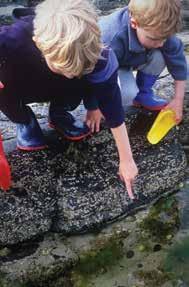
� Puck drop! It’s Kids’ Day with the Seattle Kraken as Matty, Eberle, McCann, Gruuuuuuu and all your favorite players take on the Toronto Maple Leafs. The first 5,000 kids through the door at Climate Pledge Arena earn the Kids’ Day giveaway of a team Rubik’s Cube. Purchase tickets through Ticketmaster for the game on Sunday, Feb. 26, at 4 p.m.
parentmap.com/kraken-kids ■ Nancy Chaney is ParentMap’s Out + About editor.
Don’t miss this year’s Kraken Kids’ Game on Sunday, Feb. 26. Fun for the whole family and kids take home a free Kraken Rubik’s Cube. ticketmaster.com



 By Gemma Alexander
By Gemma Alexander
If a fancy dinner and a suite at the Sorrento is your style, more power to you. But for a lot of parents, pulling off that kind of splurgy date sounds more stressful than romantic. You’ve already successfully wooed your partner, so take advantage of these low-key and offbeat Valentine’s Day date ideas for enjoying each other’s company. (And if getting a sitter isn’t an option, most of these ideas are casual and corny enough for the whole family to enjoy together.)
Going to the movies is the ultimate datenight cliché. Now that you have kids, actually watching a movie uninterrupted makes the old standby refreshing. But you
can add an extra layer of fun by avoiding the standard movie experience. Watch a silent movie accompanied by live music at The Paramount Theatre’s Silent Movie Mondays (stgpresents.org/smm). On Feb. 13, catch a screening of the 1927 romantic comedy “It,” starring Clara Bow.
Central Cinema (central-cinema.com) not only sells alcohol, pizza and small plates,
it screens cult classics in “Hecklevision,” where you can use your smartphone to send smart-alecky comments to the screen. Sing-alongs, movie trivia nights and free family cartoon nights are other draws. The 21-and-older venue Big Picture (thebigpicture.net) has full bar and food service, with fare delivered to your armchair seat.
Enrollment Open for Spring 2023 & 2023-2024 School Year!

PRESCHOOL
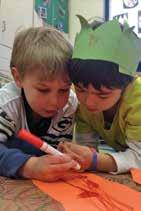
Dedicated to nurturing the growth and development of early learners in a caring, safe and fun environment onsite at Whittier Elementary.
Learn more at phinneycenter.org
Our
360-668-5145
kidscountryinc.com


continued from page 21
If you’re both athletic, by all means, make a date to play tennis or pickleball, or challenge each other to a game of one-on-one basketball. But even if you’re both card-carrying couch potatoes, “old-man sports” such as bowling and pingpong can be a fun date. Try curling, or geeky options such as quidditch or Racket: Nx (whatnerd.com). Any version of golf works, too: the classic game (there are indoor virtual options, now), miniature golf or disc golf.
Dorky sports generate gift ideas, too — consider a pair of red vintage bowling shoes, pickleball racquets à deux or a personalized curling stone. Even if you don’t stick with the sport, the gift will be a keepsake of a memorable date.
If you really want to splurge, it’s hard to top a weekend getaway to one of the Northwest’s best snow towns (parentmap.com/snow-towns). If you know how to ski or snowboard, you already know that the worst day on the mountain is better than the best day anywhere else. But even if you have no skills, playing in the snow is a rom-com trope for good reason. Tubing and sledding (parentmap.com/sledding), snowshoeing (parentmap.com/snowshoeing) or even just a good old snowball fight offers fresh air and exercise (endorphins!) while creating shared memories. Whether you go with the kids or just each other, bundle up and bring snacks and a thermos of hot chocolate or cider to take away the chill. You’ll get bonus points if you can work a hot springs dip (parentmap.com/hot-springs) or a hot tub into the excursion.
Sometimes when your kids are young, a night on the town is not worth the lack of sleep. If your kids have trained you to wake up before the crack of dawn, take advantage of the early hours you’re forced to keep with a morning date. Take the dog for a sunrise walk together. Go for a run or a bike ride and wrap things up with a breakfast you didn’t have to cook. Feel free to skip the outdoor activities if the weather is foul and head straight to your favorite restaurant or coffee shop together. And if finding a morning babysitter is too hard, hand the kids the TV remote and a box of cereal for once. Then enjoy a breakfast (made ahead of time) in bed.

Kids say the darndest things, but sometimes you crave
conversations that dig a little deeper than “Sesame Street” plots and jokes that don’t start with “Knock, knock.” If you’re in the mood for adult entertainment of the cerebral kind, consider an author reading at your favorite indie bookstore, or attend a ParentMap (parentmap.com/live — shameless plug!), Town Hall Seattle (townhallseattle.org) or Seattle Arts & Lectures (lectures.org) event. Seattle Art Museum (seattleartmuseum.org) hosts public education talks on a variety of art-related topics, and its Gardner Center hosts the Saturday University series of lectures on topics related to Asian arts and history (another good option for a morning date).
Seattle’s theater world is rich in options for both all-ages theater and shows you wouldn’t want to take the kids to. In February, consider Seattle Rep’s “Metamorphoses” (seattlerep.org), Oscar Wilde’s “A Woman of No Importance” at Taproot (taproottheatre.org) or “Into the Woods” at The Fifth Avenue Theatre (5thavenue.org). For lighter-hearted fare, enjoy a night of comedic improv or burlesque — clubs around town often have special Valentine’s Day shows. Teatro ZinZanni’s limited-run engagement “Coming Home” (zinzanni.com/seattle), has been extended through March 12.

If Valentine’s Day is the only night of the year that you go out together, you need more than just plans for an evening. Make time together a priority by committing to a recurring event. Refresh those dance lessons you took for your wedding, learn to cook a new type of cuisine by attending cooking school together, buy two season tickets to the ballet, the Macha Theatre Works’ Distillery Series (machatheatreworks.com) or Seattle Kraken (nhl.com/kraken). Join a bridge club or a bowling league together. It can be any kind of ongoing commitment, as long as you are both interested in it.
Bonus: Still can’t find the perfect idea? Peruse one of The Adventure Challenge books for couples (theadventurechallenge.com) and let it be your guide. It includes a key so you can pick a date based on time of day, whether you need a sitter and other considerations. ■

Seattle-based freelance writer Gemma Alexander focuses on the intersection of parenting and the arts. When she’s not writing for ParentMap, she blogs at gemmadeealexander.com and tweets @gemmadeetweet.


Show your love for our feathered friends by making these adorable heart-shaped bird feeders — it’s a fun rainy-day craft that your little valentines will love.

Ingredients:
1 cup wild birdseed
1/3 cup rolled oats
1/8 cup peanut butter
2 tablespoons corn syrup
2 envelopes unflavored gelatin

1/2 cup water
Materials:
Wax paper
Heart-shaped cookie cutter
Nonstick cooking spray
Natural twine or string
Instructions:
1. Line a cookie sheet with a piece of wax paper.






2. Mix birdseed, oatmeal, peanut butter and corn syrup in a large bowl.

3. Pour two packets of gelatin into 1/2 cup boiling water. Stir until the gelatin is dissolved. Stir gelatin into birdseed mix. (Add more birdseed if the mix seems too watery.)
4. Spray cooking spray around the inside of the cookie cutter.
5. Place the cookie cutter onto the wax paper. Pack the birdseed mixture into the cookie cutter, filling it about halfway.
6. Tie string into a loop and place the knotted end into the cookie cutter. Cover the end of the string with more of the birdseed mixture. Press the mixture down with your hand or a spoon.
7. Carefully lift the cookie cutter from the birdseed mixture and repeat the process until the mixture is used up.
8. Refrigerate the feeders overnight.
9. Hang your treat in a tree for the enjoyment of your backyard birds.
Note: Store extra bird feeders in a dry, cool place to prevent mold from developing. ■
The perfect place for Disney-obsessed littles, middle-school-age Marvel fiends, teens infatuated with anime and cult classics — and their parents, who love it all
 By Jenna Vandenberg
By Jenna Vandenberg
Maybe you could call Funko HQ (funko.com) a toy store. There are plushies to squeeze, board games to peruse and legions of figures in boxes to covet. But all of the jovial adults and grinning teenagers negate the toy-store vibe. This place is far more than a toy store.
Here, you’ll find different worlds to inhabit and giant Funko statues ready to be featured in selfies. You can sit in the Batmobile, peek inside Hogwarts or explore a snow-covered “Star Wars” landscape — all while choosing which Funkos to buy.
Whatever your pop culture interest might be, there is likely a Funko figure for you. Fans of “Friends” or “Stranger Things,”
K-pop or anime can buy a Rachel Green or Eleven, a Jimin or Ginshi Shirazu Funko. There are Funko Pops! of U2, Boyz II Men and Daveed Diggs (as Thomas Jefferson). Sports stars, “Star Wars” characters, Disney princesses and Marvel superheroes can all be found inside this menagerie of ultracute figurines.

Funko lore
More than a toy store or a museum, Funko HQ is a haven for collectors — called “Funatics,” naturally. Pop culture enthusiasts from all over the world make the pilgrimage to Wetmore Avenue in Everett for a chance to shop near the place where it all began.
continued on page 28
Presenting Sponsor:
Join ParentMap online to hear from experts on timely issues affecting families, educators and caregivers, and get top tips to add to your parenting toolkit.
Author and researcher Pepper Schwartz, Ph.D.

Feb. 7, 2023
Built to Last: The Surprising Secrets of Happy Couples
Bestselling author Edward Hallowell, M.D., Ed.D.

March 2, 2023
The Shifting ADHD/ADD Lens: Moving From Disability to Ability
Cultural researcher Jessica Joelle Alexander
March 22, 2023
A Parenting Playbook for Raising the Happiest Kids on Earth
Christine Carter, Ph.D., and Laura Kastner, Ph.D.
April 18, 2023
The Habits of Highly Effective Adolescents

Trauma specialist Laura van Dernoot Lipsky
May 4, 2023
Transforming Trauma and Navigating Overwhelm



Lenore Skanazy
June 6, 2023
Anxious Parents, Anxious Kids: Parenting Advice From the ‘World’s Worst Mom’
Registration is free and gains you access to the entire series: tinyurl.com/parented-feb


Attendees of the March 22 event will be eligible to win a SNOO Smart Sleeper Bassinet (valued at $1,695) or a $500 Happiest Baby gift card, courtesy of Happiest Baby.
Registrants will also be eligible to win a $100 Amazon gift card after each ParentEd talk.

Platinum Event Partner:

continued from page 25
This purveyor of pop culture started in 1998, when Funko founder Mike Becker and founding artist Rob Schwartz bonded over their love of swap meets and roadside Americana vibes. They began Funko by designing bobbleheads — which they called Wacky Wobblers — and securing licensing deals with brands such as fast-food chain Bob’s Big Boy, cartoon character Betty Boop and New Line Cinema’s sequel to the spy spoof “Austin Powers: International Man of Mystery.” Soon they were creating Wacky Wobblers of all kinds of characters and shipping out toys from their office in downtown Everett. A cult following burgeoned, and in 2002 Funko hosted its first fan event: Funko Funday.
Now, Funko Funday is hosted for one night during the San Diego Comic-Con. Impossible-to-get tickets for the event sell out in nanoseconds.
The instantly recognizable Funko Pop! figures — giantheaded, big-eyed replicas of fan-favorite actors, characters and other notables from the pop culture zeitgeist — debuted in 2010, when the company began working with DC Comics. First designed to be a plushie, the block-head design was configured in vinyl instead and debuted at the 2010 Comic-Con. Although some old-school fans initially hated the design because it wasn’t a bobblehead, more women and kids started buying Pops! and a global sensation was born.
With all of Funko’s worldwide fame and obsessive fans, it’s a bit miraculous that the company’s headquarters, one of only two dedicated retail spaces, is located in Everett. It’s practically our duty as Pacific Northwesterners to pay homage to the place.
Every morning, a gaggle of Funko fans queues up to await the store opening in hopes of getting their hands on new or exclusive figures. Arriving early and joining this crowd can be fun, as you are likely to get an earful about the joys of finding a hard-to-get item. Exclusive Funkos are typically released on Mondays, Wednesdays or Fridays. However, if the Funatic whisper network telegraphs an exciting new release, long morning lines can accumulate at a moment’s notice. Check out the company’s Facebook page (facebook.com/funkohq) for updated hours, peeks at exclusives and news about special events.
If you can’t make the trek to Everett until a weekend or school holiday, be prepared to wait in a line that snakes around the building. You could easily be standing there for an hour. Karl’s Bakery and Cafe (facebook.com/karlsbakeryandcafe) is next door,

should you require caffeine or sustenance. The streets surrounding Funko feature free 90-minute parking, and it’s usually pretty easy to find a spot.
Cash is not accepted at the store. Backpacks and water bottles aren’t allowed, but lockers are available to stash your belongings. There are bathrooms inside the store, but no food or drink options are available. There is neither a fee to enter nor a time limit once you get in.

Once inside


Remember that line you stood in? You’ll appreciate that crowd-control protocol once you enter the store. Not only are fewer folks breathing and sneezing in your vicinity, but your attempts to take pictures of your kids next to the Princess Tiana statue won’t be thwarted by people walking through your photo shoot.
If you venture in a counterclockwise


direction, you’ll first wind through Wetmore Forest, where mossy trees drape over wood land creatures. Next up is a pop culture and Marvel section, featuring a Batmobile to sit in and Godzilla to pose next to. There are toy safes tucked into the walls with levers to pull and gears to turn as kids try to crack the code. You’ll next navigate a 1950s-inspired section of Funko Vinyl Soda displays, featuring mini statues tucked inside soda cans, in front of a “Jeopardy”-style TV show showcasing Funko-related trivia questions. Then there is a Disney castle to walk through, complete with the Hulk busting through walls and Spider-Man clinging to the roof. The “Star Wars”–themed area presents a
snowy landscape from “The Empire Strikes Back.” In the last world, you’ll be greeted by Harry, Hermione and Ron at Hogwarts.
A standard Funko Pop! is reasonably priced at $12, so it is possible to leave the store with your bank account relatively undented. However, if you are in the mood to spend hundreds of dollars, there are scads of gift sets, pins, plushies, games, T-shirts and Loungefly backpacks to choose from. Plan to spend about an hour in the store, although if you want to examine every shelf or take a series of selfies, you could easily spend a couple of hours inside. ■


Mom of two Jenna Vandenberg teaches history at a public high school north of Seattle.
One of the central tenets of Judaism is doing good in one’s community and in the world at large. Such acts of contribution are reflected in the words of Judaism’s prophets, sages and ancient texts: There’s tzedakah (charitable giving), gemilut hasadim (acts of kindness) and one of the most widely known phrases, tikkun olam (repairing the world). These values are especially important when it comes to fostering the next generation of Jewish changemakers.
Going beyond a focus on academics, Jewish day schools immerse students in a curriculum that nurtures and fosters community-minded engagement, around the world and right here at home in Washington state.
From providing service to the local community through volunteer work and fundraising to international mission trips to help people in need, Jewish day school students are learning firsthand what it means to be a global citizen.


This past year, after receiving a call from the Jewish Ukrainian orphanage Tikva Children’s Home in Odessa (tikvaodessa.org), seniors from Northwest Yeshiva High School (nyhs.org) took their educational values and translated them into action by flying to Romania with only 10 days’ notice. Their purpose was to support hundreds of children who had been displaced by the war in Ukraine.
The call for help came while the group was on a service trip to New Orleans with NCSY Relief Missions (reliefmissions.ncsy.org), a Jewish teen relief organization. The organization learned that there was a severe shortage of volunteers and staff to work with hundreds of children ranging in age from newborn to 16 years. As a grantee of the Samis Foundation, NYHS immediately reached out for a grant to support as many students as possible with the opportunity to join the Romania mission.
“We’re proud of the students for responding to this call for help, and we, at Samis, were honored to play a small role in supporting the mission,” says Eli Genauer, Samis Foundation board chair.
At the Jewish Day School of Metropolitan Seattle (JDS; jds.org), cultivating “upstanders,” or people who will proactively stand up for good in the world, is central to its mission. Teachers at the school lead by example to demonstrate the upstander ethos. JDS teacher Nance Adler spent this past summer as a scholar in residence in Germany. After Adler taught a class on Jewish resistance and the rescue of Jews by non-Jews during the Holocaust, German teachers at the institution highlighted a recent instance of bigotry at the school. Following Adler’s class, the call to be upstanders was invoked in a staff meeting to encourage administration and faculty to take a united stand against expressions of hate and bigotry.
SJCS students plant daffodils to honor victims of the Holocaust and current humanitarian crises today.When Gov. Inslee’s March 12 announcement prompted school closures across Washington state, local Jewish day schools were already prepared for distance learning. By that day, Seattle Jewish Community School, along with other Jewish day schools in the Seattle area, had soft-launched their remote learning program, seeking feedback from students, parents and teachers and getting everyone up to speed.
“It was like I had hired 12 brand new teachers despite the decades of seniority and experience they had,” says Head of School Ron Waldman. “In this format, all bets are off. None of our educators had ever been trained for this type of teaching and learning, and not all children can easily adapt to continuous learning.” Even though they’ve had their challenges, Seattle Jewish Community School — along with Northwest Yeshiva High School, Jewish Day School and Seattle Hebrew Academy — are making it work, teaching students important lessons and forging strong communities at the same time.
While global change is impressive, there is also plenty of work to be done right in our own backyard. And Jewish day schools are getting in on the action there, too.
Emerging from the pandemic, local Jewish schools have poured countless hours into building community and offering services to ensure their students and families feel a stronger sense of connection and responsibility. Providing meaningful experiences through volunteer work is one way the schools are strengthening bonds. Working with the Seattle Parks and Recreation department this past year, students at the Seattle Jewish Community School (sjcs.net) planted hundreds of daffodil bulbs to honor the memory of children who perished in the Holocaust and to call attention to those suffering in humanitarian crises today. Students had the opportunity to aid local wetlands in the process.
It started with surveying everyone’s needs. On their first day, NYHS held an orientation for distance learning, where all classes met for 15 minutes each and there was a check-in to make sure students had access to technology. They also conducted troubleshooting with teachers so that the following day regular classes could start. Schools are continuing to seek feedback throughout this crisis. According to Waldman, SJCS is sending out surveys at least once a week, while JDS is adjusting practices as they go. “We have made revisions to our remote learning schedule and instruction along the way, based on feedback from families,” says JDS Head of School Vivian Scheidt. “Our teachers have reached out individually to each family to get their input on how their child is doing with remote learning.”
At MMSC Day School (mmscdayschool.org), giving back comes in the form of spreading joy. Students routinely craft holiday cards and gift baskets for the elderly and those in need.
As schools try out different modalities for remote learning, they are discovering the value of using a variety of formats, including full class groups, small groups and individualized meetings, as well as instructional goal reassessment. “Beyond the objectives of getting through a syllabus and finals, we are finding that instruction has become learner-centric, with students increasingly driving their learning and building community in a more thoughtful and intentionally deeper way. This has really been the silver lining of distance learning,” says Feld.
According to foundation CEO Connie Kanter, “Our mission is to support Jewish continuity through the education of Jewish youth. Jewish day schools are the most impactful way for us to cultivate future Jewish community members and leaders.”
SHA Head of School Rivy Poupko Kletenik emphasizes that learning is the focus, but community building and engagement are vital as well. SHA has organized a drive-by food drive and held virtual events for Jewish holidays and days of remembrance. Each of the schools is engaging with people inside and outside of their school community by hosting open virtual classes, celebrations and commemorations.
To make Jewish day schools in the Seattle area more accessible to families that are juggling important financial priorities, the program ensures that for families earning up to $350,000, K–12 tuition will not exceed $15,000 per year per child or 15 percent of the family’s adjusted gross income, whichever is lower. This initiative is aimed at aiding families that don’t qualify for traditional financial aid and as a result, are priced out of giving their children a day-school education.

“Our Jewish day school partners have been doing an incredible job making sure students stay connected and continue receiving exemplary academic instruction in these unprecedented times,” says Connie Kanter, CEO of the Samis Foundation, an organization that provides grants to support K–12 Jewish education in Washington state and initiatives in Israel. Samis supports scholarships, tech education, special needs and professional development for seven Jewish day schools in the Seattle area. The foundation has put a particular emphasis on supporting the schools’ technology needs for the past decade. “We hope other educators in the public and private sectors can benefit from our schools’ models.”
Similarly, at Seattle Hebrew Academy (seattlehebrewacademy.org), every year students partner with Jewish Family Service (jfsseattle.org) to combat food insecurity by participating in multiple food drives as part of the school’s mission to prepare future generations to lead lives of service and fulfill mitzvot (commandments) in Seattle, Israel and worldwide. Sharing in this mission is Torah Day School of Seattle (tdsseattle.org) and Derech Emunah (derechemunah.com), where students provide service to the community by hosting blood and bone marrow drives.
The schools, which already participated in a tech cohort Community of Practice led by Dr. David Wicks, Seattle Pacific University’s chair of Digital Education Leadership, also made sure they had the right tools to conduct classes, including Zoom, Edpuzzle, Google Meet, Kahoot!, Camtasia, Screencast-O-Matic and Seesaw. Since traditional teaching won’t work on these platforms, NYHS Head of School Jason Feld says they’ve encouraged teachers to come up with exciting new methods. “The charge to the faculty was to be brave in experimentation and to really let learning objectives drive the technology, not the other way around.” Teachers at NYHS have drawn on what they learned during Seattle’s 2019 “Snowmaggedon,” such as using flipped instruction, a blended learning strategy that allows the students to see the material before the class and then dive deeply into it with their classmates during school hours. “That experience really did serve us quite well in preparation for this year,” says Feld.
To increase accessibility and participation in high-quality experiential Jewish education for youth in Washington state, the Samis Foundation launched its Day School Affordability Initiative in 2022.

The opportunity to immerse themselves in their unique Jewish heritage, traditions and community, and emerge with an education that instills the value of giving back from both a local and global perspective, should be available to every student. Ultimately, this is what the Day School Affordability grant program is all about. While it will take a generation for today’s students to grow up and embody the principles of leadership, communal responsibility, charitable giving and the importance of doing acts of kindness in the world, that feels like an outcome well worth waiting for.
To learn more about sending your child to Jewish day school and to find out if your family is eligible to receive a Day School Affordability Initiative grant, visit the Samis Foundation website at samisfoundation.org.
While schools and families are taking this tough situation one day at a time, 10 years from now, some are optimistic that students will look back at this moment with reflection. “I hope that they will remember this as a time of personal growth, and as a time where a lot of what we talk about in our dayto-day learning of grit, resilience, kindness and community was tested in a real way during this crisis,” says Feld. “My hope is that instead of feeling isolated, they will have some meaningful memories.”
SPONSORED BY:
THE SAMIS FOUNDATION SUPPORTS K–12 JEWISH EDUCATION IN WASHINGTON STATE AND INITIATIVES IN ISRAEL. FOR MORE INFORMATION, VISIT SAMISFOUNDATION.ORG.






